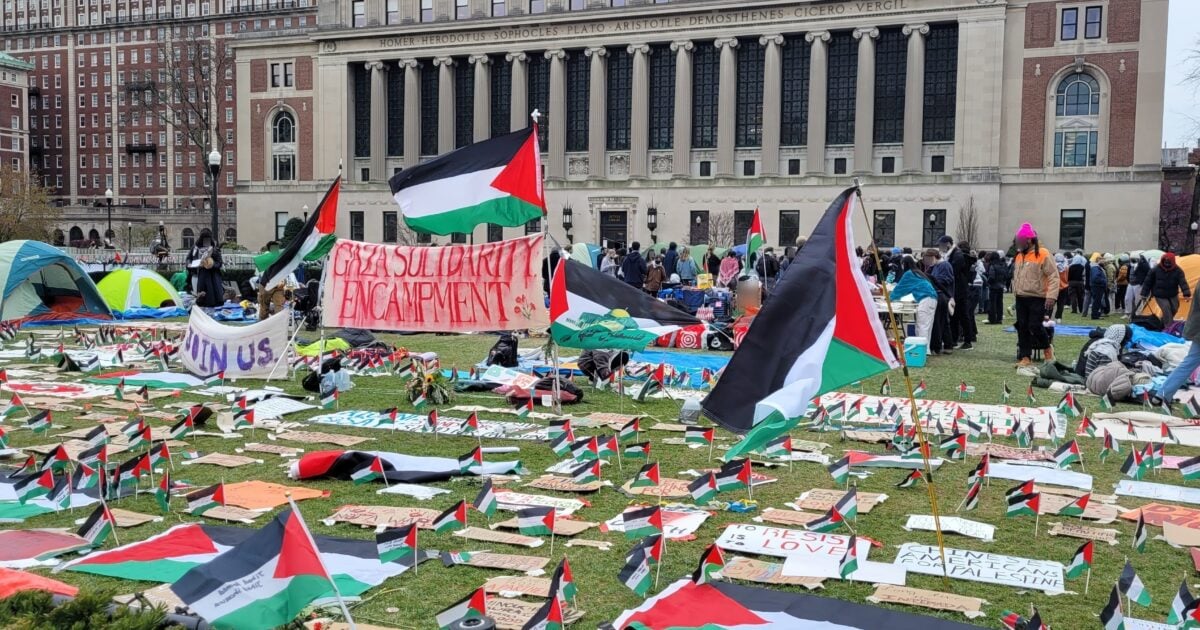

Photo from Wikimedia Commons, CC0 1.0 Universal Public Domain Dedication, Date: 21 April 2024, 14:07:15
Claims circulating on social media and in certain mainstream media outlets suggest that numerous student visas were revoked arbitrarily and without cause. However, a closer inspection of the facts shows that these revocations were justified. According to Secretary of State Marco Rubio, the number of student visas revoked is in the thousands, and the actions were part of a targeted policy aimed at addressing national security concerns.
The visa cancellations were tied to specific behaviors and affiliations, particularly those involving support for entities deemed hostile or dangerous by the U.S. government, such as transnational terrorist or criminal organizations.
This policy initiative, known informally as “Catch and Revoke,” was implemented by the Trump administration in early 2025. The Department of State employed artificial intelligence tools to scan public social media posts for indicators of support for terrorist organizations, including Hamas and Hezbollah, or for activities that undermine U.S. national interests. According to U.S. officials, some revocations were based on cellphone content found during secondary screening procedures. In one case, a student had photos and videos expressing support for Hezbollah, which prompted immediate visa cancellation.
Secretary Rubio made it clear that student visas are intended strictly for academic purposes. He publicly stated that foreigners studying in the U.S. who engage in actions viewed as “destabilizing” should expect to lose their visa privileges. The administration emphasized that studying in the U.S. is a privilege, not a right, and that non-citizens must comply with the expectations tied to their visa status.
Contrary to claims that students were targeted for nothing more than political beliefs, multiple reports show that some visa revocations were linked to past legal violations. A Turkish student at the University of Minnesota was detained in March after his visa was canceled due to a previous drunk driving conviction. Other students reportedly lost their visas over infractions like speeding tickets. While these violations may seem insignificant, U.S. immigration law grants broad discretion to revoke visas for a wide range of conduct that may raise character concerns or suggest a failure to uphold U.S. legal norms.
The White House defended the visa revocations under a provision of the 1952 Immigration and Nationality Act, which gives the Secretary of State the authority to expel foreign nationals if their continued presence is believed to pose “potentially serious adverse foreign policy consequences” for the United States. This legal justification has been on the books for decades and has been used across multiple administrations, though rarely on this scale.
Further clarifying the administration’s stance, Secretary of State Marco Rubio explained in a Department of State newsletter that Catch and Revoke is a “one-strike policy,” stating, “Whenever the government catches non-U.S. citizens breaking our laws, we will take action to revoke their status.”
He confirmed that the policy applies not only to students who have “supported terrorists or otherwise abused our hospitality,” but also to immigrants convicted of crimes such as domestic violence and assault. This hardline approach reflects the administration’s broader effort to reinforce both immigration integrity and national security.
The situation became especially politicized as many of the affected students were involved in pro-Hamas activism during a period of heightened campus unrest. Civil liberties groups argued that the visa revocations violated First Amendment protections and unfairly targeted students based on their political views.
However, legal experts noted that the U.S. Constitution does not grant non-citizens the same protections when it comes to visa eligibility, and the government maintains broad authority in matters of national interest and immigration. Moreover, many of the revocations were unrelated to campus protests and instead stemmed from legal infractions and other clearly justified causes.
In response to mounting legal pressure, the Department of Justice ultimately reversed the policy, reinstating the immigration records of many affected students. This retreat came amid concern that the mass revocations lacked sufficient due process and could not withstand judicial scrutiny.
Nevertheless, the episode demonstrates that the student visa revocations were not baseless. They were rooted in longstanding laws and enforcement powers that allow the government to revoke visas when non-citizens violate the terms of their stay or pose security risks. While the “Catch and Revoke” policy amplified these measures and sparked controversy, the legal grounds behind such revocations have existed for decades.
To characterize the situation as “student visas pulled for no reason” is factually incorrect. The revocations were based on intelligence, conduct, policy criteria, and in many cases, students simply breaking the law. As usual, the media either lied outright or twisted the truth so far it nearly broke.
The post No! Student Visas Were Not Revoked for No Reason appeared first on The Gateway Pundit.

